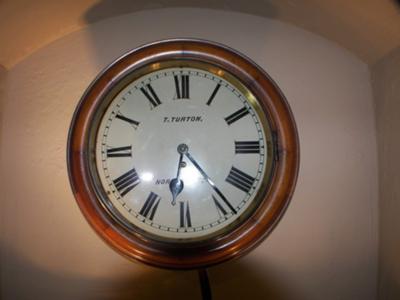Antique English pendulum wall clock
by BYRON GODFREY
(CHANDLER, AZ., USA)

Our English Clock
We have an old English pendulum wall clock by T. Turton of Northampton, England UK (no chimes or strikes).
About 5 years ago it was reconditioned by an elderly, since retired, local Phoenix, Az. USA craftsman, and has been reliable ever since.
Recently, we moved. We removed the pendulum and carefully transported the clock personally. Once I had it set up and persevered adjusting the clock in the new house, I could not get the clock to run for more than 10 minutes.
I decided to take the clock down, oil and replace it, which proved successful, the clock running nonstop with an even tick. However, the clock is losing about a minute an hour, even though I have raised the pendulum weight progressively and ridiculously higher than originally.
It seems that the clock will go no faster, a situation which I can't understand, though I'm no clock expert. I'm using the correct oil recommended by a local repair shop and it seems very light. Your comments would be appreciated.
Comments for Antique English pendulum wall clock
|
||
|
||
|
||
|
||